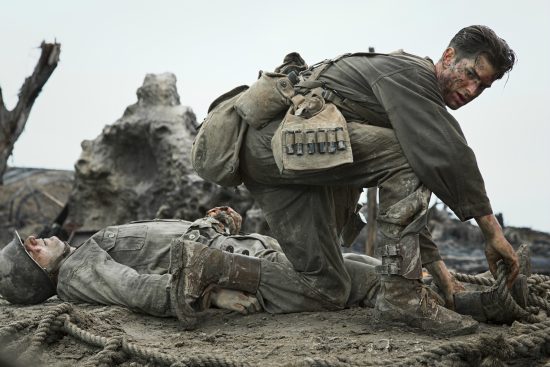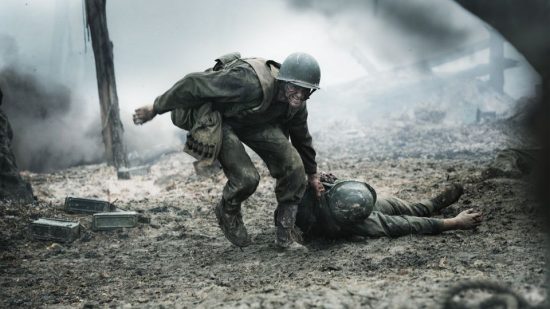Review: Hacksaw Ridge – “It’s great to have Mel Gibson back behind the camera”
Mel Gibson is back, ladies and gents, and it looks like he’s going to stick around. His fifth feature film as a director is the perfect combination of all the elements recurring in his work behind the camera – heroism, machismo, war, violence, religious faith – which are once again explored through a real life tale, albeit a little known one, set within a huge piece of our history, World War II.
One of the greatest qualities of cinema is often the ability to unearth true stories that we probably would remain unaware of and what an incredible, inspirational story lies at the core of Hacksaw Ridge – one that most certainly couldn’t be more fitting to the current unstable times we are experiencing all around the world.
This is the story of Desmond Doss, the first conscientious objector to receive the U.S. Medal of Honour, played with relentless energy, compassion and dedication by the amazing Andrew Garfield, one of the most talented young actors of our time. It’s no surprise Gibson cast him in a part that it’s meant to finally bring this true American hero to the spotlight he deserves, albeit posthumously. Not many actors possess the same level of sensibility and empathy that have made the former amazing Spider-Man both a fan and industry favourite.
After all, this is the hard-to-believe true tale of a man, who chose to serve in the army without ever touching any weapon or react with any form of violence during his service, yet in the process he saved dozens of lives and not just those of his own comrades. Fuelled by an incredible faith in God and surely shaken and scarred by a couple of dramatic episodes whilst growing up, Desmond made a vow that he kept all the way through to the end whilst taking part in the American siege at Hacksaw Ridge in Japan.
The film is structured in two main parts – the first one follows Desmond from his childhood to enlisting and the second one throws him in the midst of the gory horror of the trenches – and the transition is underlined by an inevitable stylistic shift.
Gibson uses the first half to establish our protagonist and plant the seeds that will push him to make the choice of enlisting, despite having just found love and despite the opposition of his father (Hugo Weaving), a trauma-stricken, former military man turned into an abusive alcoholic.
The second half chronicles Desmond’s unbelievably selfless act of heroism on the field and the filmmaker echoes the action and graphic violence of Braveheart, throwing us right in the middle of the battle ground in such a realistic fashion, vividly recreated by the brisk camera work and the powerful soundscape, all masterfully edited together.
It’s been a decade since Oscar winner Mel Gibson directed his last movie, the epic action adventure Apocalypto, and we all know very well why it took him this long to make another film. As I approached the viewing of Hacksaw Ridge, I must admit it was hard to make peace with the fact that I was about to support someone who, by all means, is a despicable human being.
When he launched his parallel filmmaking career in 1993 with the hugely underrated drama The Man Without A Face, Gibson immediately became one of my favourite directors. I still remember the goosebumps whilst watching Braveheart upon its theatrical release, when I was 15. That’s why I was heartbroken when his true colours became a matter of public interest – I felt betrayed by one of my heroes.
Whilst I most certainly am not one who forgets, I am prone to forgive and I want to believe Andrew Garfield’s recent comments on how this isn’t just Gibson’s comeback behind the camera but the return on the public scene of a man who has done a lot of work on himself. After all, in his director’s statement, the filmmaker’s reasons for choosing to tell this story seem to be genuinely in tune with the spirit of someone who has made amends or at least is working on it…
“When I heard the story of Desmond Doss, I was astounded by the extent of his sacrifice. Here was a man who, in the most pure, selfless, and almost unconscious way, repeatedly risked his own life to save the lives of his brothers. Desmond was a completely ordinary man who did extraordinary things. He underwent intense persecution for his refusal to waver in his conviction, then went on to enter the hell of war armed with nothing more than his faith, and emerge one of the greatest war heroes of all time. The humility he maintained in discussing his heroics is a testament to the mettle of the man. In fact, Desmond was asked permission for years to adapt his story into a film, and repeatedly declined, insisting that the ‘real heroes’ were the ones in the ground. In a cinematic landscape overrun with fictional ‘superheroes’, I thought it was time to celebrate a real one.”
As Hacksaw Ridge‘s incredibly heart-pounding second half kicks in, it’s hard to believe that you’re watching a dramatization of events that actually happened. Maybe that’s why, besides paying homage to the now departed Doss, the director poignantly wraps the film with a brief documentary epilogue that introduces us to the real Desmond and some of the other real people that we have just seen on screen.
It’s great to have Mel Gibson back behind the camera and this incredibly inspirational tale is the perfect return for a filmmaker who is a master at crafting emotion-stirring stories of epic proportions. Of course Hacksaw Ridge‘s accomplishment is also the merit of its brilliant cast, led by the ever-growing talent of Andrew Garfield, whose grit and grace in this role are a joy to watch. In a world that desperately needs guidance and inspiration, Doss’ story couldn’t be more relevant, reminding us that superheroes do exist and they are just human like you and me.
Hacksaw Ridge is now in UK cinemas.












